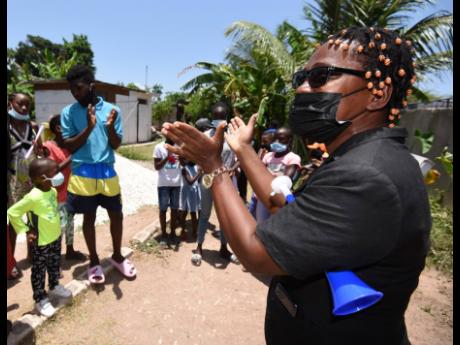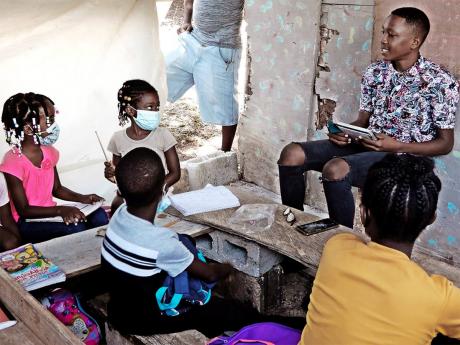Kristen Gyles | The best and worst of our COVID colours
They say that tough times reveal true character. Amidst all the uncertainty, fear and grief brought on by the pandemic, much of our previously well-masked colours have now been put on display. The pandemic has done a lot in reducing quality social interaction, but we can hold ourselves responsible for the relationships we destroy and for the animosities we create in scoring political points or in causing division.
The pandemic has presented fertile ground for deep-seated biases and prejudices to take root and flourish. Every time there is a surge in COVID-19 cases, confusion seeps its way into the open, and it does so in the form of some very problematic biases. The truth is, Jamaicans blame Jamaicans for everything Jamaicans do when it comes on to this virus. If they go to church, the ‘worldlians’ will blame the spike in COVID-19 cases on them. If they go to the ‘round robin’, the church people will say they are reckless and need God. If they meet up with friends for lunch, they are irresponsible and if they stop eating out, they aren’t supporting the economy and the business community will call them paranoid and will bemoan the country’s economic losses on the lack of support.
Unlike many others, I won’t join the bandwagon of blaming the COVID-19 spread on our so called ‘bad behaviour’. The truth is that once there is movement, there is the possibility of the virus spreading and ‘bad behaviour’ has simply become a label for all activities we individually consider to be unnecessary, and, therefore, irresponsible during a pandemic. Of course, with different priorities, we will all have different perspectives on what such activities actually are. After all, for some, jumping on a plane to pay a visit to relatives overseas, during a pandemic, is careless and bad behaviour.
BEING HUMAN
If I had a dollar for all the non-church goers I’ve heard complaining about churches being allowed to operate during the pandemic, I’d have enough money to eat out with them twice a month at their usual restaurants. Bias will tell you that it is irresponsible to be at church, but it’s perfectly fine to eat out every now and again. It’s also perhaps just as fine to take a well-needed trip to the beach, especially if you call it a mental health ‘break’. For goodness’ sake, we have found a way to blame the COVID-19 spread on people burying their dead. I get it. You mourn by sobbing quietly with your head in your hands, drying your tears periodically with two squares of tissue. Others who mourn ‘bawl out’ in anguish and throw themselves on nearby relatives at the graveside. That’s not being irresponsible. It’s being human.
But there is very little humanity nowadays in the way we chastise each other over the simplest differences. This pandemic seems to have unearthed all the possible shades of nasty that personalities can have. As a separate matter to our many prejudices, some of us have lost all sensitivities. How far is too far in nudging persons to get vaccinated? Who would have thought that people would resort to mocking the dead as a means of scaring the unvaccinated into getting their shots? Persons now resort to posting pictures of their own deceased relatives with all kinds of labels: “Preventable Death” and “You don’t have to die!”. They go on to exhort: “Get vaccinated, people.” Again, I get it. Serious times call for serious measures, but have some class. Using someone’s death as an object lesson, especially within a context of others grieving their loss, is not only unconstructive but tactless. Furthermore, there is no need for the vaccine interrogation of family members and friends when people die. Vaccination status may have become the new prerequisite for your pity when it comes on to the dead and the grieving, but leave others to grieve in peace.
STEPPED UP
On the other hand, the pandemic hasn’t only pulled the bad and the ugly out of us. For many, what has surfaced is self-sacrificing compassion. Many have stepped up to the call of duty – not out of obligation but by choice. It has also revealed greater levels of resourcefulness and creativity and has forced us to look beyond ourselves in a time when the pandemic has found the most unique ways of causing distress around us. We’ve seen numerous examples of this, in the persons of teacher Taneka McKoy-Phipps who found a way, despite the natural challenges associated with the pandemic, to paint blackboards on community walls so she could share educational content with students, and Kelvin Peart, 14-year old Ferncourt High School student-teacher who started tutoring from his home during the pandemic, even while he had his own online classes. These are not isolated cases. All around Jamaica, many have been putting their differences aside to help whoever they can, wherever they can.
We also see sacrifice and selflessness everyday in our hospitals, from healthcare workers, many of whom put their own health at risk for very little in return. Even though it is easy to see what looks like unbridled callousness and selfishness in our neighbours, let’s recognise the difficulty with which some are navigating this trying experience and exercise some understanding in how others cope. The pandemic has really revealed the best and the worst in us. It’s not too late, however, to decide what impact we want the pandemic to have on our behaviour moving forward. Whether the pandemic turns us into mean-spirited grinches, who thrive on sowing seeds of division, is up to us. We can choose instead to become understanding of how difficult coping with the effects of the pandemic is for many persons who are very different than we are and who are living very different lives.
Kristen Gyles is a graduate student at the University of the West Indies, Mona campus. Email feedback to kristengyles@gmail.com.


